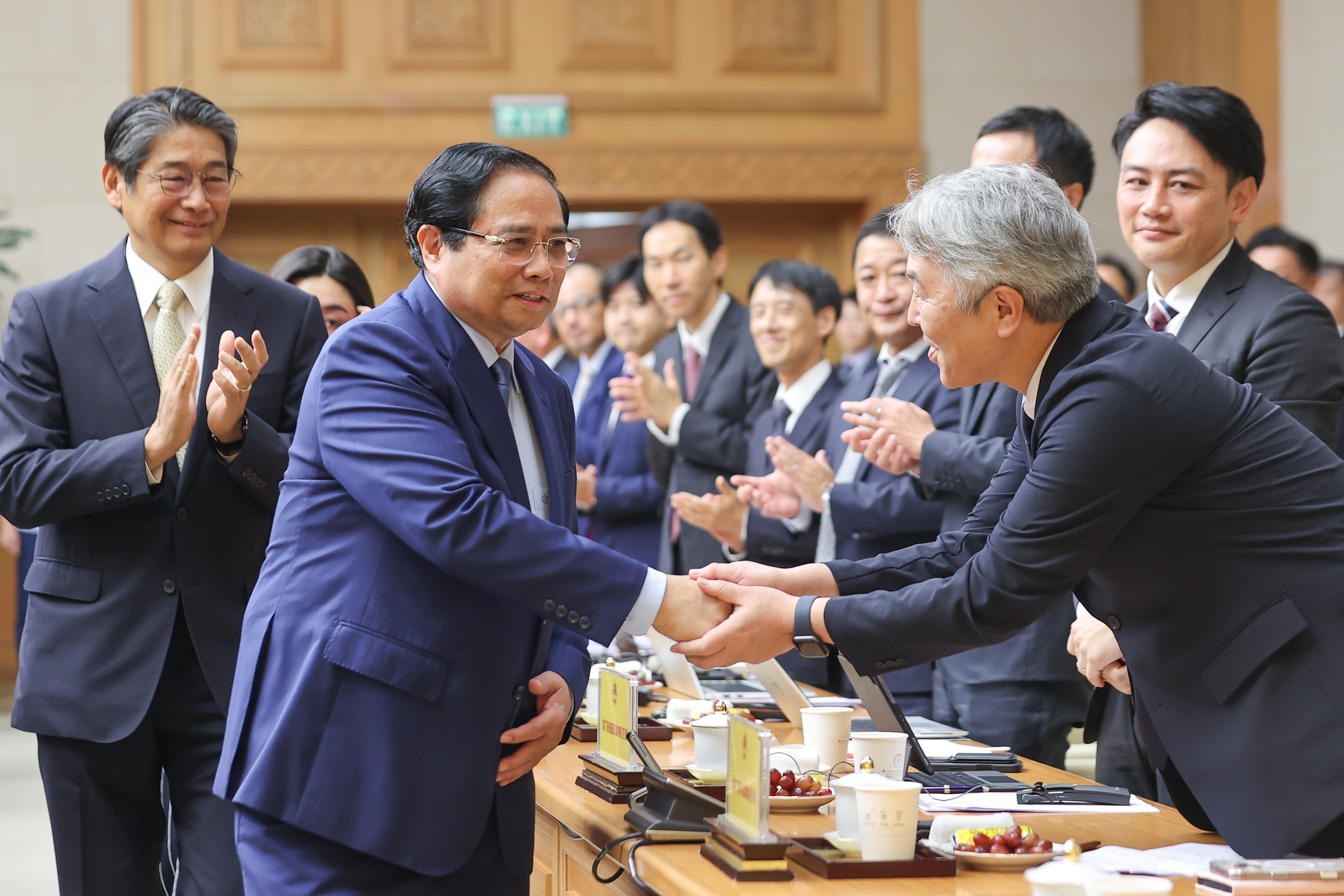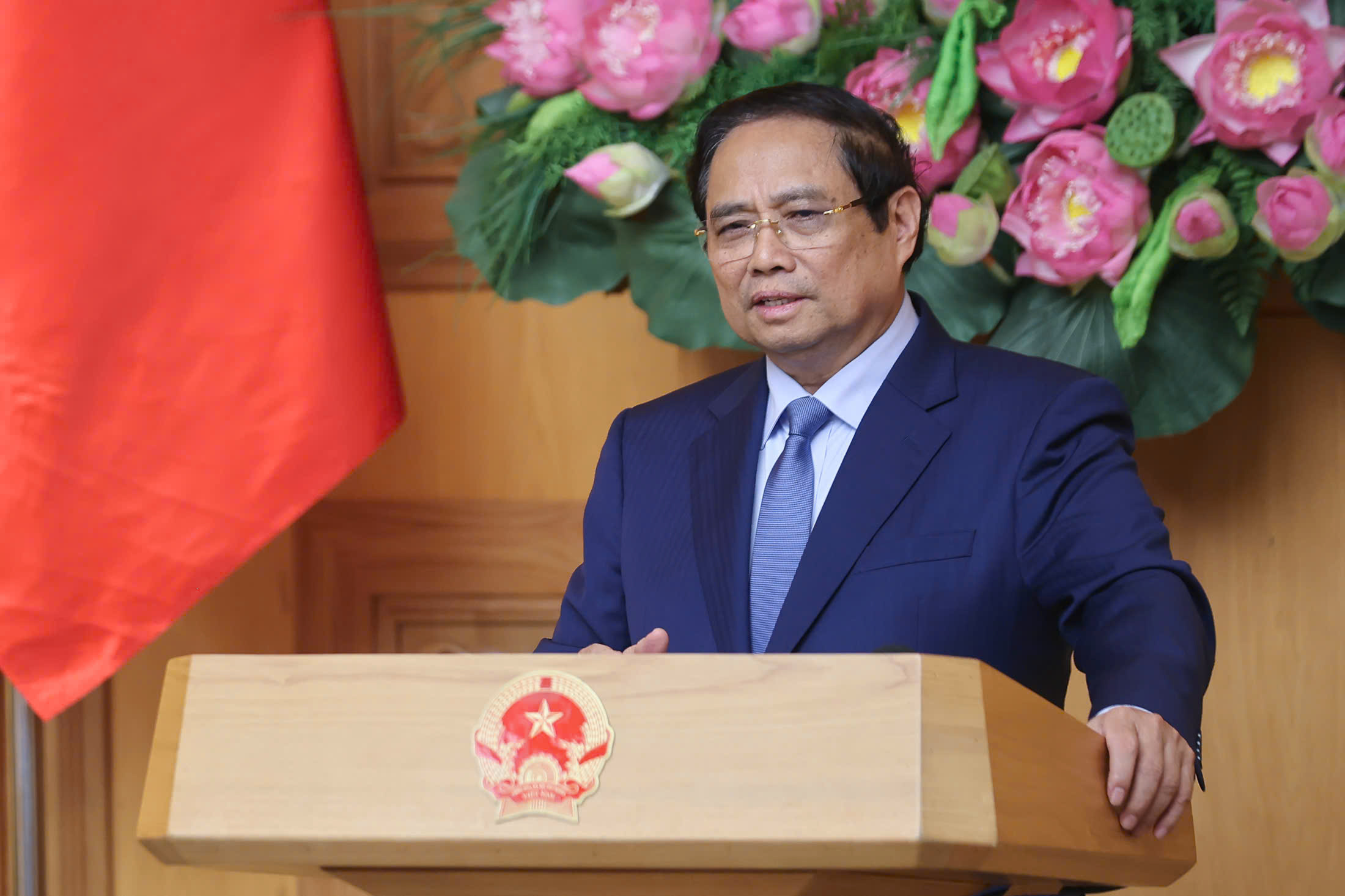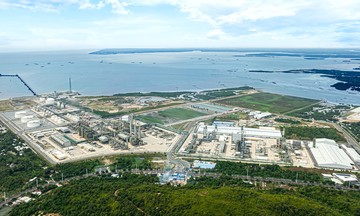On 12/8, Prime Minister Pham Minh Chinh chaired a discussion with Japanese businesses. This was the prime minister's second meeting this year with investors from Japan, aimed at strengthening cooperation, resolving obstacles, and maximizing project efficiency.
During the discussion, Japanese businesses requested the prime minister's continued support in addressing difficulties encountered in projects such as the Ben Luc - Long Thanh expressway, Ho Chi Minh City's metro line 1 (Ben Thanh - Suoi Tien section), the Viet - Japan Friendship Cho Ray Hospital, and the Vietnam - Japan University. They also raised concerns about obstacles in developing hybrid vehicles.
Japanese businesses also urged Vietnam to continue implementing projects like urban railway lines in Hanoi and Ho Chi Minh City, the North Hanoi smart city project, and the financial restructuring of the Nghi Son Refinery and Petrochemical Complex.
 |
Prime Minister Pham Minh Chinh with Japanese business representatives on 12/8. Photo: Doan Bac |
Prime Minister Pham Minh Chinh with Japanese business representatives on 12/8. Photo: Doan Bac
According to Prime Minister Chinh, many issues raised by the Japanese businesses align with areas Vietnam is actively addressing, including proposed amendments to the Land Law, tax refund regulations, and food safety.
He also suggested solutions to the issues raised by the Japanese businesses. Regarding the transition to green transportation, the prime minister emphasized that reducing emissions, protecting the environment, and responding to climate change are global concerns requiring collective efforts, including from Japanese companies.
"Vietnam's highest priority is to maintain independence and sovereignty while ensuring a happy and prosperous life for its people," he said.
Concerning ongoing projects, the prime minister proposed establishing a joint task force to address outstanding issues within August. He stressed the importance of ensuring mutual benefits and shared risks. In cases where issues arise beyond existing regulations, the task force should propose solutions to the appropriate authorities, learning from these experiences for future projects.
"Our approach must be thorough and decisive, based on open-mindedness, active listening, mutual trust, and clear assignment of responsibilities and deadlines," he added.
Regarding new project proposals in energy and railways, the prime minister assigned ministries and local authorities to collaborate with Japan, considering their feedback on administrative procedures and policies related to land, taxes, food safety, and other relevant areas.
 |
Prime Minister Pham Minh Chinh speaking at the discussion with Japanese businesses on 12/8. Photo: Doan Bac |
Prime Minister Pham Minh Chinh speaking at the discussion with Japanese businesses on 12/8. Photo: Doan Bac
Vietnam and Japan have a comprehensive strategic partnership. Japan is a leading economic partner, the largest provider of ODA and labor cooperation, the third-largest investor, and the fourth-largest trading and tourism partner for Vietnam.
As of the end of July, Japan had over 5,600 projects in Vietnam with a total capital of 79.4 billion USD. Japan ranks third among 151 countries and territories investing in Vietnam, with notable projects including the Nghi Son Refinery and Petrochemical Complex, smart city initiatives, and the Nghi Son 2 BOT Thermal Power Plant. Conversely, Vietnamese companies like FPT and VMO have invested in 126 projects in Japan (20.5 million USD).
During the recent visit of the Japanese prime minister to Vietnam, both sides affirmed key areas of cooperation for the future, including semiconductors, digital transformation, green transformation, and disaster prevention.
At the discussion, Japanese Ambassador to Vietnam Ito Naoki emphasized the two prime ministers' agreement on improving the business environment, leveraging the strengths of Japanese businesses. He noted that Japanese companies are observing the reforms and anticipating opportunities for cooperation with Vietnam.
Ambassador Ito Naoki praised the resolution of issues between the two sides, contributing to the positive progress of bilateral cooperation and investment projects. He mentioned that Japan will propose a new project and loan packages within the framework of the Asia Zero Emission Community (AZEC).
Vietnam is pursuing three strategic breakthroughs: institutions, infrastructure, and human resources. The government prioritizes rapid and sustainable development, focusing on a green economy, digital economy, and circular economy driven by science, technology, innovation, and digital transformation.
Prime Minister Chinh requested continued support from Japan, including its businesses, in finance (including FDI, new-generation ODA, indirect investment, and participation in the Vietnam International Financial Center). He encouraged Japanese businesses to expand investment in Vietnam to foster high-quality human resource training, technology transfer, and smart governance.
The prime minister also invited feedback from Japanese businesses to help Vietnam improve its institutions and suggested preferential mechanisms to attract investment from Japan. He also requested support for Vietnamese businesses to integrate into Japanese and global supply chains.
Phuong Dung












